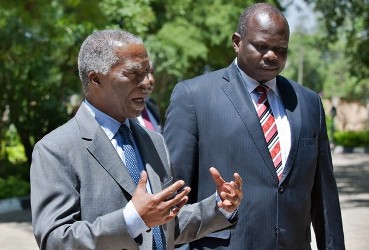S. Sudan, AU panel suffered “extreme” pressure to reach deal, Pagan
August 7, 2012 (JUBA) – South Sudan’s negotiating team and the African Union mediators were subjected “extreme” pressures from the international community to reach clinch a deal on oil, Pagan Amum, the country’s lead negotiator told journalists on Tuesday.
 Amum, while addressing journalist, however said, the pressure was mainly aimed at forcing them to “give away” the resources of South Sudan, under the guise of pursuing their own interest.
Amum, while addressing journalist, however said, the pressure was mainly aimed at forcing them to “give away” the resources of South Sudan, under the guise of pursuing their own interest.
“It is true that the Government of South Sudan and the negotiating team, including myself personally as a chief negotiator were subjected to extreme pressure from the Americans, British, the Norwegians…and they were forcing us to give away the resources of South Sudan,” he said.
He further accused the international community of siding with Khartoum against South Sudan, on issues of oil, wealth sharing and border demarcation, contrary to international principles of neutrality.
“They were telling us…if Khartoum is taking your oil, let them take it. Continue to pump the oil. [But] When we told them the people of South Sudan have the right to own their resources and if Khartoum is taking their oil, then we will stop the flow, they said no, no”, Amum said, adding that those who were pushing South Sudan had their own agenda to pursue.
Both Sudan and South Sudan on 3 March agreed on oil transportation fees, after a compromise proposed by the mediation, ending month of negotiations between the two parties following South Sudan’s decision to shut down its oil production early this year.
Oil revenues, prior to the shutdown, accounted for nearly 98 percent of South Sudan’s annual budget, while Sudan lost 75 percent of revenues from oil after the South Sudan split from it in July last year.
GLOBAL WITNESS URGES TRANSPARENCY
Meanwhile, Global Witness on Monday welcomed the announcement of an oil deal reached by Sudan and South Sudan, but stressed the need for the final text to ensure transparent implementation.
“Agreement on the basics of an oil deal is great progress”, said Dana Wilkins, a Global Witness campaigner.
“However, the devil is in the detail, and the long-term success of this agreement will depend on how it is implemented and monitored”, she added.
According to Global Witness, the 2005 Comprehensive Peace Agreement (CPA), which ended the last civil war, was partly based on a deal to split southern oil revenues 50:50 between the two governments.
The agreement, it added, reportedly contained no safeguards to ensure transparency or independent verification in its implementation, thus creating mistrust and concerns over cheating, which repeatedly threatened the fragile peace.
The publication of the text of the agreement, it argued, would build trust and provide a sustained incentive for peace between the two countries, adding that the final oil deal must guarantee total transparency in its implementation, taking into account the following;
- • Regular and timely records of the volume of South Sudanese oil transiting Sudan’s processing facilities, pipeline, and marine terminals.
- • All payments made and received by either government on the basis of the deal.
- • Any discrepancies in the records and any concerns raised by the Monitoring Team.
(ST)
